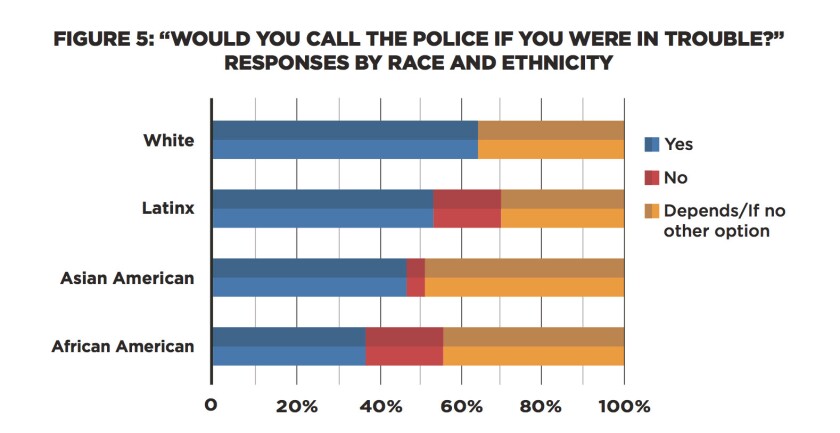Over a third of young adults in Chicago — especially African Americans — want out of this city, citing racism, fractured police-community relations, neighborhood disinvestment and lack of jobs and economic mobility, a new study finds.
The University of Chicago’s GenForward Project surveyed African-American, Asian, Latinx and white young adults from 10 diverse neighborhoods, and found 36 percent want to leave the city — but as high as 46 percent in challenged neighborhoods like Englewood.
“We know that young people, especially millennials, are now the largest generation. They comprise the largest share of the workforce and eligible voters. To think about the shape of the country or the city without centering their voices is a mistake,” said Cathy Cohen, GenForward founder and U of C political science professor.
Not surprisingly, “Race & Place: Young Adults and The Future of Chicago,” found stark disparities in perspectives of white vs. African-American and Latinx young adults. For example, 1 in 3 African-American, 1 in 6 Latinx and 1 in 10 Asian millennials said they can’t depend on Chicago police in an emergency, vs. 8 percent of whites.

A study found stark disparities in perspectives of white young adults in Chicago vs. African-American and Latinx; 1 in 3 African-American, 1 in 6 Latinx and 1 in 10 Asian Millennials said they can’t depend on Chicago police in emergencies, vs. 8 percent of whites. | Source: “Race & Place: Young Adults and The Future of Chicago,” by GenForward/University of Chicago
Based on in-depth interviews with 200 residents ages 18-29, the study, to be released Wednesday, offers ominous insights for a city steadily losing inner-city population — and critical spotlights for its next mayor, four weeks out from the Feb. 26 mayoral election.
“We know that there is already population loss happening in the city of Chicago, primarily from African-American communities, and the data in this report suggests that population loss, in particular among African Americans, will continue,” Cohen said.
“At this moment when we’re getting ready to elect a new mayor, the question is to what degree can candidates articulate a future that will resonate with young people who will populate that future?”

Over 1/3 of young adults in Chicago — especially African Americans — want out of this city, citing racism, fractured police-community relations, neighborhood disinvestment and lack of jobs and opportunity for upward mobility, a study finds. | Source: “Race & Place: Young Adults and The Future of Chicago,” by GenForward/University of Chicago
Culling young adults from Albany Park, Bridgeport, Chinatown, Englewood, Lake View, Lincoln Park, Near North Side, Pilsen, West Englewood and West Town, the report is the first city-based survey by GenForward, founded at U of C in 2016 to turn a microscope on the pivotal millennial generation — ages 18-34.
GenForward’s bi-monthly, nationwide surveys primarily explore how race and ethnicity influence millennials’ world perspectives, with “Race & Place” the first to delve into the lived experiences of millennials in one city. Among findings:
- Stark differences in job access and opportunities by neighborhood/race — unemployment among North Side respondents, for example, was 5 percent, Pilsen, nearly 15 percent, Chinatown-Bridgeport, nearly 20 percent, and Englewood, over 25 percent.
- Young adults’ priority concerns also were tied to neighborhood/race, with crime and law enforcement the only common theme among all races and neighborhoods, with more than half of respondents citing crime/violence the most significant concern.
- Education too was a major concern of young adults, from the quality of Chicago Public Schools, to school closings and college access, with nearly 50 percent of North Side respondents having obtained college degrees, vs. 35 percent in Chinatown-Bridgeport, 30 percent in Pilsen, and less than 10 percent in Englewood.

Crime and/or violence was commonly cited among three top concerns of African-American, Asian, Latinx and white young adults from 10 diverse Chicago neighborhoods: Albany Park, Bridgeport, Chinatown, Englewood, Lakeview, Lincoln Park, Near North Side, Pilsen, West Englewood and West Town. | Source: “Race & Place: Young Adults and The Future of Chicago,” by GenForward/University of Chicago
“The question is often raised: ‘Are we pushing people out of the city?’ Well, if you’re not providing quality education for a neighborhood, and young people feel they don’t have good job prospects, and can’t afford the homes in their neighborhoods they dream of, and the city isn’t attending to those issues, then yes, you’re pushing people out of the city,” said Cohen.
“Can the city re-imagine itself in a way that gives these young people a reason to stay?”





